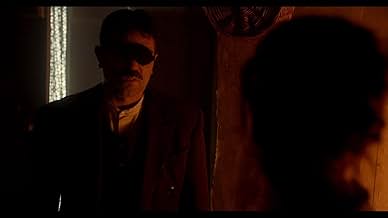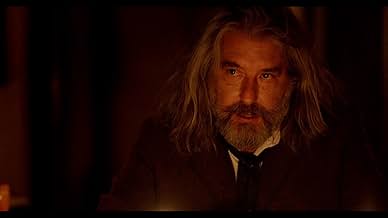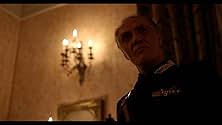CALIFICACIÓN DE IMDb
4.4/10
1.7 k
TU CALIFICACIÓN
Sigue al santo católico Padre Pío en sus primeros años.Sigue al santo católico Padre Pío en sus primeros años.Sigue al santo católico Padre Pío en sus primeros años.
- Dirección
- Guionistas
- Elenco
- Premios
- 1 premio ganado y 1 nominación en total
- Dirección
- Guionistas
- Todo el elenco y el equipo
- Producción, taquilla y más en IMDbPro
Opiniones destacadas
So this has to be by far the most disappointing film I've seen in 2023. Why? I was so looking forward to this film for over a year before its release, expecting some semblance of a Padre Pio biopic. What I got instead? A completely different film whose plot involved the struggle of communists vs fascists in a small provincial Italian town, with Padre Pio being an incidental character who wasn't relevant to the plot AT ALL. In fact, had it not been for the last few seconds of the film's ending where they show him getting the stigmata, Padre Pio could have literally been interchanged with any generic provincial Italian friar. I'd even go a step further: if all his scenes were deleted from the film, it would not have changed the plot in the slightest whit. I would have at least been a bit more forgiving if they had taken 'artistic liberties' with telling Padre Pio's life, as some over-enthusiastic biopics tend to do.... but they didn't even do that! They do not discuss, flesh out, or even relay the tiniest iota of the story of Padre Pio... he is merely an incidental and inconsequential character in a story involving the early struggles of Italian partisans against the nascent fascists. I'm not saying that there is anything inherently wrong with that type of story (though truth be told, even that was bland and uninteresting), but if that was the main point and intent of the film, then the filmmakers should have been up front about it, and shouldn't have duped the audience by disguising this as having anything remotely to do with Padre Pio. Shame, as Padre Pio's story is fascinating on its own, and actually TELLING his story would have been immensely more interesting than this insipid drivel we were given here.
I've genuinely anticipated this movie, especially after the multiple pushbacks of the release date. I even saw the interviews LaBeouf has done about the sincerity behind his role as Padre Pio and conversion to Catholicism.
Unfortunately, the following of the political unfolding was very mundane and bare. And worse off, there was minimal tie between the current events to Padre Pio's influence on the people outside of maybe the Eucharist and a couple confessions.
I certainly can say every scene LaBeouf was in, he carried extremely well, but these were sparsely placed throughout the film, and felt very removed from the rest of the movie. However, these scenes still did have a depth and spiritual sense of sacredness that I wish pervaded more of the movie. The moments of his anguish and torment were compelling, but short lived, especially because they were juxtaposed against the aforementioned weakness of the exterior events.
When showing the forced labor the villagers were facing, the cinematography was very jagged and disorienting. I understand it was meant to instill a sense of anxiety and arduousness against the still, calm lensing of Pio's sanctuary, but it was so pronounced that it was just distracting and dizzying. I could get used to an Oliver Wood style of camera shake in an action movie, but it didn't work with this film.
There was little to no tension to the storyline to really illicit a yearn for resolution. Because of this, the film lacked emotional substance, and not stakes. I'm usually content with slower paced movies as long as there's still a sense of building tension.
Again, Shia's performance did stand out, but outside of that, I'm afraid to say this movie really did not carry the viewer through the depth and influence of Padre Pio. Not Shia's fault, more on the writers and director.
I think a better film around this monastic spiritual genre would be "Of Gods and Men."
Unfortunately, the following of the political unfolding was very mundane and bare. And worse off, there was minimal tie between the current events to Padre Pio's influence on the people outside of maybe the Eucharist and a couple confessions.
I certainly can say every scene LaBeouf was in, he carried extremely well, but these were sparsely placed throughout the film, and felt very removed from the rest of the movie. However, these scenes still did have a depth and spiritual sense of sacredness that I wish pervaded more of the movie. The moments of his anguish and torment were compelling, but short lived, especially because they were juxtaposed against the aforementioned weakness of the exterior events.
When showing the forced labor the villagers were facing, the cinematography was very jagged and disorienting. I understand it was meant to instill a sense of anxiety and arduousness against the still, calm lensing of Pio's sanctuary, but it was so pronounced that it was just distracting and dizzying. I could get used to an Oliver Wood style of camera shake in an action movie, but it didn't work with this film.
There was little to no tension to the storyline to really illicit a yearn for resolution. Because of this, the film lacked emotional substance, and not stakes. I'm usually content with slower paced movies as long as there's still a sense of building tension.
Again, Shia's performance did stand out, but outside of that, I'm afraid to say this movie really did not carry the viewer through the depth and influence of Padre Pio. Not Shia's fault, more on the writers and director.
I think a better film around this monastic spiritual genre would be "Of Gods and Men."
The First World War has just ended, but peace is far from the Italian village of San Giovanni Rotondo. As families welcome back their loved ones from the battlefield, a new conflict brews between the socialist peasants and their oppressive landowners. Meanwhile, in the village convent, Capuchin friar Padre Pio is having a crisis of faith. Encountering demons and suffering from vivid, dark hallucinations, will the friar overcome his troubles, and will the villagers find their freedom?
Directed by Abel Ferrara, 'Padre Pio' is a witless Frankenstein's monster: a strange, plodding drama that feels like two vastly different films spliced poorly together; neither of which are very good. Written by Ferrara and Maurizio Braucci- alongside whom Ferrara wrote the far more interesting 'Pasolini'- the film aims to explore themes of spirituality and politics in post-war Italy, but ends up saying nothing at all. The links between the story involving the villagers and the one concerning the titular character are tenuous and poorly explained, while the complete package is so slow and tedious it would be more worthwhile watching paint dry.
Moreover, the dialogue is stilted and cliched, with the villagers' arguments for and against socialism being especially trite and banal. Often, it sounds like bad improvisation- and the fact that the mostly Italian cast struggle to deliver their lines in English doesn't help matters. Additionally, although Ferrara tries to juxtapose the suffering of Pio with that of the villagers, it doesn't work, feeling ham-fisted at best. Furthermore, his portrayal of the friar isn't sympathetic, nor interesting, with no backstory or characterisation. There's no reason to root for him, and his dull journey towards stigmata simply isn't engaging.
Having said that, there are moments throughout that hold interest, even if they're too few and far between. An all-too-short scene involving a character confessing his lust for his daughter brims with an intriguing menace, while the opening sequence- in which soldiers return from the war- is well realized, with minimal dialogue. Unfortunately, scenes like those are rare gems in a sea of mediocrity, and the majority of the narrative is a slog.
On the other hand, Alessandro Abate's muted cinematography adds a dose of realism to proceedings, and is consistently striking. Tommaso Ortino's production design lends additional authenticity to the picture, while the set and costume design is of a particularly high quality. However, Joe Delia's score- incorporating, at one point, Southern chain-gang music- is overblown, lacking subtlety or power.
Shia La Beouf stars as the titular character, delivering a performance of staggering self-indulgence, going so over-the-top he makes Nicolas Cage in 'Vampire's Kiss' look like a masterpiece of understatement. It is a misjudged attempt to outdo Daniel Day-Lewis in the intensity department, making Padre Pio look petulant, insane and dour. His Italian co-stars all do more nuanced work, but the impact of their performances are severely hampered by their having to speak in English. Worth mentioning, however, is Asia Argento, who plays the incestuous father, injecting some much-needed energy into a lifeless film.
In conclusion, Abel Ferrara's 'Padre Pio' is a failure, both as a biopic of the titular character and as a drama concerning Italian socio-political history. Drab, dull and disappointing, the narrative lacks wit, insight and entertainment value, while the dialogue is consistently contrived and unnatural. While the cinematography and production design are commendable, the score is poor and the central performance from Shia LaBeouf is terribly over-the-top. In short, it's a boring waste of time, deserving Three Hail Marys, and nothing more.
Directed by Abel Ferrara, 'Padre Pio' is a witless Frankenstein's monster: a strange, plodding drama that feels like two vastly different films spliced poorly together; neither of which are very good. Written by Ferrara and Maurizio Braucci- alongside whom Ferrara wrote the far more interesting 'Pasolini'- the film aims to explore themes of spirituality and politics in post-war Italy, but ends up saying nothing at all. The links between the story involving the villagers and the one concerning the titular character are tenuous and poorly explained, while the complete package is so slow and tedious it would be more worthwhile watching paint dry.
Moreover, the dialogue is stilted and cliched, with the villagers' arguments for and against socialism being especially trite and banal. Often, it sounds like bad improvisation- and the fact that the mostly Italian cast struggle to deliver their lines in English doesn't help matters. Additionally, although Ferrara tries to juxtapose the suffering of Pio with that of the villagers, it doesn't work, feeling ham-fisted at best. Furthermore, his portrayal of the friar isn't sympathetic, nor interesting, with no backstory or characterisation. There's no reason to root for him, and his dull journey towards stigmata simply isn't engaging.
Having said that, there are moments throughout that hold interest, even if they're too few and far between. An all-too-short scene involving a character confessing his lust for his daughter brims with an intriguing menace, while the opening sequence- in which soldiers return from the war- is well realized, with minimal dialogue. Unfortunately, scenes like those are rare gems in a sea of mediocrity, and the majority of the narrative is a slog.
On the other hand, Alessandro Abate's muted cinematography adds a dose of realism to proceedings, and is consistently striking. Tommaso Ortino's production design lends additional authenticity to the picture, while the set and costume design is of a particularly high quality. However, Joe Delia's score- incorporating, at one point, Southern chain-gang music- is overblown, lacking subtlety or power.
Shia La Beouf stars as the titular character, delivering a performance of staggering self-indulgence, going so over-the-top he makes Nicolas Cage in 'Vampire's Kiss' look like a masterpiece of understatement. It is a misjudged attempt to outdo Daniel Day-Lewis in the intensity department, making Padre Pio look petulant, insane and dour. His Italian co-stars all do more nuanced work, but the impact of their performances are severely hampered by their having to speak in English. Worth mentioning, however, is Asia Argento, who plays the incestuous father, injecting some much-needed energy into a lifeless film.
In conclusion, Abel Ferrara's 'Padre Pio' is a failure, both as a biopic of the titular character and as a drama concerning Italian socio-political history. Drab, dull and disappointing, the narrative lacks wit, insight and entertainment value, while the dialogue is consistently contrived and unnatural. While the cinematography and production design are commendable, the score is poor and the central performance from Shia LaBeouf is terribly over-the-top. In short, it's a boring waste of time, deserving Three Hail Marys, and nothing more.
Padre Pio is portrayed as being in a constant state of suffering. The last scene shows the stigmata and the entire movie seems to be leading up to that point. The film's purpose seems to be that the stigmata was real. Knowledge of Padre Pio is required before this movie will make any sense. Keep your finger on the volume dial for the whole movie. The sound is either so quiet that you have to turn it up to 70% and then there are points where it is so loud you have to turn it down to 20%. Most of the plot is boring and the nudity is unnecessary and precludes showing this film to a lot of people. In the movie, Padre Pio is disconnected from other people and I gather this movie will also not connect with many people either. Rent this film but do not buy it. It is an unpleasant, uninspiring movie. It does not draw people to faith.
Despite the historical events and perhaps leading characters personal dark and heavy route towards becoming who he was that does not mean they film needs to also be so dark.
It seems that lately films are more and more separated into fluff and pop corn blockbusters and then you have these heavy "artistic" or religious or quasi intellectual films where they examine certain characters or events. So that after the viewers and producers can pat each other on the back how smart and deep their introspection is.
While not too long ago, directors knew how to interweave complex, dark or troublesome events with light, with entertainment , with charismatic characters to offput that or moments to balance it out. Intellectual and dark doesnt mean it needs to be heavy and difficult to watch.
Very very few know how to do this nowadays, Lebeoufs films never do. They are just plain dark and uncomfortable to watch. Especially ones like this, where they (unfortunately only) focus on the most heavy part of his journey to becoming Padre Pio everyone knows.
It seems that lately films are more and more separated into fluff and pop corn blockbusters and then you have these heavy "artistic" or religious or quasi intellectual films where they examine certain characters or events. So that after the viewers and producers can pat each other on the back how smart and deep their introspection is.
While not too long ago, directors knew how to interweave complex, dark or troublesome events with light, with entertainment , with charismatic characters to offput that or moments to balance it out. Intellectual and dark doesnt mean it needs to be heavy and difficult to watch.
Very very few know how to do this nowadays, Lebeoufs films never do. They are just plain dark and uncomfortable to watch. Especially ones like this, where they (unfortunately only) focus on the most heavy part of his journey to becoming Padre Pio everyone knows.
¿Sabías que…?
- TriviaThe filming locations are places Padre Pio lived or visited.
Selecciones populares
Inicia sesión para calificar y agrega a la lista de videos para obtener recomendaciones personalizadas
- How long is Padre Pio?Con tecnología de Alexa
Detalles
- Fecha de lanzamiento
- Países de origen
- Idiomas
- También se conoce como
- Молодой Папа
- Locaciones de filmación
- Productoras
- Ver más créditos de la compañía en IMDbPro
Taquilla
- Total a nivel mundial
- USD 12,100
- Tiempo de ejecución
- 1h 44min(104 min)
- Color
Contribuir a esta página
Sugiere una edición o agrega el contenido que falta


























